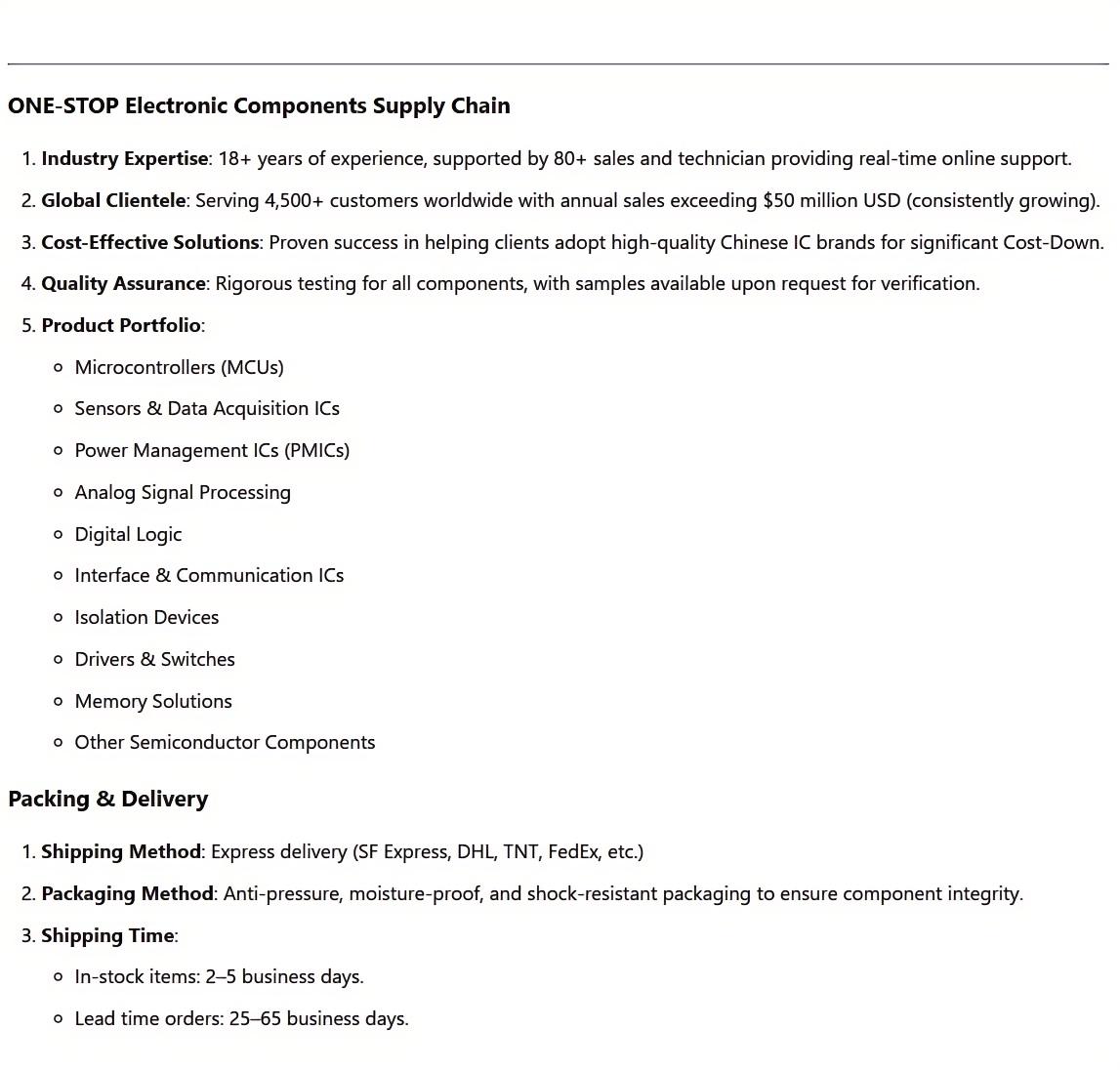GD32F307VET6 is a Replacement parts of
STM32F207VET6/STM32F217VET6
/STM32F407VET6
Mfr.Part No. :
GD32F307VET6Manufacturer :
GigaDeviceDescription :
Arm® Cortex®-M4 32-bit MCUPackaging :
TRAYPackage :
LQFP-100(14x14)Stock :
in stockPrice :
$1.9-$2.7
GD32F307VET6
| Price: | $1.9-$2.7 | $6.8-$9.8 |
|
Replace parts:
Replacement parts:
Alternative parts:
Pin to pin parts:
|
GD32F307VET6 |
STM32F207VET6
STM32F217VET6
STM32F407VET6
STM32F207VET6TR
STM32F217VET6TR
STM32F407VET6TR
|
The GD32F307VET6 offers superior performance compared to the STM32F207VET6, thanks to its 168 MHz Cortex-M3 core versus the STM32F207VET6's 120 MHz Cortex-M3. This clock speed difference provides a notable boost in processing power, enabling faster execution of complex tasks and improving overall system responsiveness.
In terms of memory, both chips offer similar configurations with 512 KB Flash and 128 KB SRAM, making them comparable in terms of available storage for applications. However, the GD32F307VET6 stands out in its peripheral integration, offering a comprehensive set of interfaces, including USB 2.0, CAN, I2C, SPI, and more. The STM32F207VET6, on the other hand, features fewer communication interfaces, limiting its flexibility in certain system designs.
Furthermore, the GD32F307VET6 is optimized for low-power operation, providing power efficiency during low-power modes. This makes it ideal for applications requiring prolonged battery life, such as automotive systems and portable devices, where the STM32F207VET6 might require additional power management solutions to achieve similar results.
When compared to the STM32F217VET6, the GD32F307VET6 excels in clock speed, running at 168 MHz, compared to the STM32F217VET6's 120 MHz. This increased clock speed results in a faster execution of tasks, reducing system latency and improving overall processing efficiency, especially in real-time applications. The GD32F307VET6 is better suited for high-performance embedded systems such as industrial control, sensor networks, and consumer electronics.
While both chips offer 512 KB Flash and 128 KB SRAM, the GD32F307VET6 provides more advanced peripherals, including USB 2.0, CAN, I2C, and SPI, enabling superior flexibility in various connectivity scenarios. The STM32F217VET6 offers similar peripherals but lacks the full set of advanced communication options, making the GD32F307VET6 a more versatile solution for a wider range of applications.
Additionally, the GD32F307VET6 is designed with better power management, offering lower power consumption during idle states. This contributes to longer battery life in power-sensitive applications, making the GD32F307VET6 a more energy-efficient choice compared to the STM32F217VET6.
The GD32F307VET6 outperforms the STM32F407VET6 in terms of clock speed, with a 168 MHz operating frequency compared to the STM32F407VET6's 168 MHz. Although both chips run at the same speed, the GD32F307VET6 benefits from its efficient design, delivering better performance-per-watt, making it ideal for energy-constrained applications.
Both chips come with 512 KB Flash and 128 KB SRAM, offering comparable memory resources for applications. However, the GD32F307VET6 differentiates itself with a more diverse set of peripherals, including USB 2.0, CAN, I2C, and SPI, ensuring higher connectivity options for complex system designs. The STM32F407VET6 offers similar features but lacks the comprehensive set of peripherals provided by the GD32F307VET6, limiting its flexibility in some cases.
Moreover, the GD32F307VET6 incorporates enhanced power management features, providing improved energy efficiency for low-power applications, compared to the STM32F407VET6, which typically consumes more power under similar operating conditions.
When compared to the STM32F207VET6, STM32F217VET6, and STM32F407VET6, the GD32F307VET6 proves to be the more advanced solution, offering higher processing power, a richer peripheral set, and superior power efficiency. With its 168 MHz clock speed, more advanced communication interfaces, and optimized power consumption, the GD32F307VET6 is a better fit for performance-intensive embedded systems, including automotive electronics, industrial control, and consumer electronics.

Hot Tags :